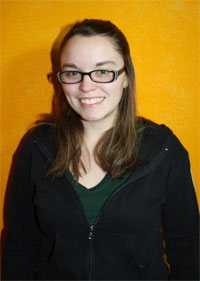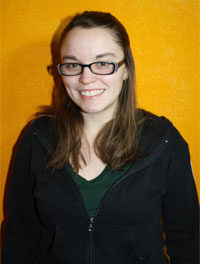By Melissa Boyd (Whetstone editor)
As a new education major this year, I had been worried about Wesley’s education department regaining its accreditation.
So, preparation for the visit from the National Council Accreditation for Teacher Education (NCATE) ruled my thoughts for a good couple of weeks.
I thought about everything the education department asked me to do – including how to present a class assignment that showed how we assess students’ progress – how I was going to do it, and reflected for several weeks prior to the actual visit on how important it was for both me and the school.
The emotional preparation for the visit from NCATE’s Board of Examiners (BOE) presented me with two extreme emotions: terror and pride. But mostly terror.
I felt terror –under the idea of presenting to the BOE, my feet iced, my heart raced and my palms sweat.
I also felt pride, however, because I was specifically picked by one of my professors to present. By her choice, she believed I was worthy and capable of helping our education program.
As the weeks grew nearer to the Nov. 13 presentation, my heart beat even faster.
The physical preparation was easier to handle.
A week before, student presenters held their first group practice meeting in Budd Hall. We were given “how to introduce yourself and your project†pamphlets, which helped us to learn exactly what to say and how to say it.
I was a part of the assessment team.
So during this practice meeting, I met with two education professors and another student. The professors asked us questions that the BOE might ask about our presentations. With each answer we provided, our teachers critiqued them.
Before this meeting, we had received a paper telling us what might be asked of us. In my assessment group, we could have been asked things like, “How do you assess your student’s ability to comprehend our lessons?†and our answers may have included tests, rubric-style essays or projects. After this meeting, we knew a detailed explanation of what we were to say.
But I was still confused, and definitely still nervous. I didn’t understand how long we were supposed to talk about our presentations. I wasn’t sure what questions they might ask after each person did his or her presentation. Would they be nice people or would they have stone faces? Would they laugh and be comfortable around us, or would they be there solely to do their job?
Just a few days before the presentation, we received in our classes a tutorial on what to say and how to say it. This helped even more. This tutorial included questions that might be asked and what answers first-year students should know and be able to provide the BOE members with.
I felt better after those days.
On Nov. 12, the BOE was here. Although I didn’t meet with them yet, the pressure was still on. While I sat at work, trying to concentrate on doing my work, I could imagine my professors being interrogated with questions that scrutinized our program. Why did we need such an intense observation of our program? I love our program and I know a lot of my peers do, too. So, why does our major have to receive such criticism from people all over the country, as well as in our own school? The pressure put on education professors to properly present our program was too much, in my opinion, and I could feel their pressure on me even as I was away from the school.
On Nov. 13, it was the big day for me. Again, I sat at work, thinking about every single possible thing that might be asked of me, how I would respond, how the College Center would look as we had our tables all set up. I imagined everything, and all of those possibilities drove me crazy all Sunday morning.
I left work and came back to school, to quickly change into a nicer outfit. My heart was beating so fast that I could feel the beat pulse my head, too. Usually, I’m not the nervous type. I like to give presentations because I know what I’m talking about and I want everyone else to know that I know what I’m talking about. I guess you could say I like to brag that I am informative. This presentation did not provide me with the same confidence prior presentations had.
I got there at 3:30, and students signed in. Our professors greeted us and directed us to our proper tables, and then offered us the beverages and food that was set around the lobby. I’m not sure much of anyone had an appetite at that point. I know I didn’t.
At around 4 p.m., Dr. Johnston welcomed the BOE members. Dr. Dwyer then gave a short welcome speech, and we began. The BOE walked around to each table. There were six BOE members, and they were required to visit each table.
At our assessment table, we started with the youngest in the program and worked our way up to the student obtaining his master’s degree in education. This meant every time a new BOE member came to the table, I was the first to present. This was a little nerve-wracking, but I got over it. We talked about how our specific assignments helped assess our future students, and then we answered any of the questions they might have for us.
Some of the questions included, “What is diversity in a classroom?†“Why is it important to assess our students?†and “Do you feel prepared when you student teach?†These, to me, were very simple questions. The BOE members were polite, not the stone-cold faces I had imagined.
I lost my nervousness with each passing moment of being there. When the meeting was over, we were allowed to mingle or we could leave. I mingled for just a couple of minutes, and then I left. We had been there for a little more than two hours, and I was ready to leave.
On Nov. 14, I was invited to a meeting with about 20 other education majors (both K-8 and Physical Education K-12). There were two BOE members who asked all twenty of us different questions about our program. Personally, I thought this was a very comfortable setting. It was a discussion, rather than an interrogation.
I felt pride, even in only my first year in the education program. Not one student there could have felt anything but pride because their answers positively affected our program. We were asked similar questions on this day, but other questions also included, “If you could change anything about the program, what would it be?†“What does conceptual framework mean in your program?†and “Do you think you get field experience early enough in the program?â€
Like I said, this was a very easygoing meeting.
I didn’t go to the Nov. 15 meeting because I was told the meeting was similar to the Nov. 14 meeting, except that the Nov. 15 meeting invited all education majors.
I can assume that meeting, along with all of the rest, went well because I was informed that the BOE members told our education professors that we passed. Although this cannot be confirmed until the spring, my heart fluttered at the prospect of passing. I’m sure I’m not the only one.




